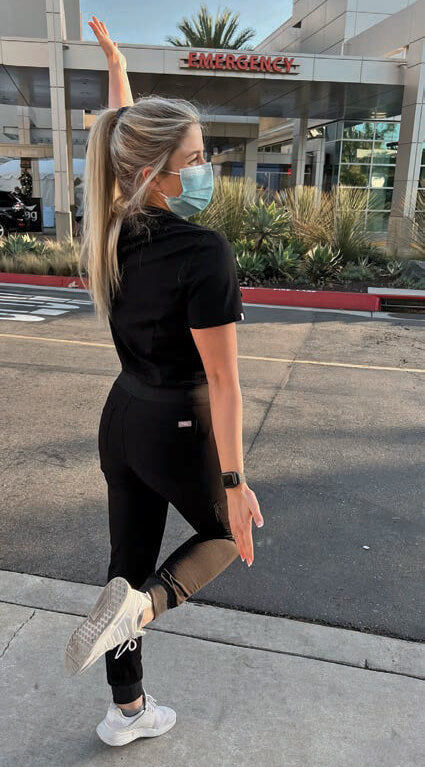Nursing Advice: 4 Tips for the Aspiring Emergency Nurse
By Stephanee Beggs, RN
The bulk of the skills and knowledge essential for your role will be acquired through hands-on experience.
1. LEVEL UP YOUR ER APPLICATION
 THE TRICK TO STANDING OUT is to cater your application and your resume to critical care situations that you’ve experienced. Utilize critical terminology and consider these changes:
THE TRICK TO STANDING OUT is to cater your application and your resume to critical care situations that you’ve experienced. Utilize critical terminology and consider these changes:
- Previous job history: Cater your previous job “descriptions” to things commonly seen in ER. That way, they know you have some exposure to future ER situations!
- Certifications: Every new graduate nurse has the same qualifications post-nursing school. Consider getting your NIHSS, ACLS/PALS, and Management of Assaultive Behavior (MAB) to add to your resume.
- Experience:
- CNA/EMT/Phlebotomy/Medical Scribe experience/COVID testing
- Volunteer experience and/or school externships
The trick to standing out is to cater your application and your resume to critical care situations that you’ve experienced.
- Leader of any organization (shows you took initiative)
- ANY experience with pediatrics, elderly, L&D, outpatient/inpatient, fire, law enforcement, etc.
2. PREPARE FOR ER-SPECIFIC INTERVIEW QUESTIONS
- Why are you interested in the Emergency Department specifically? Have you had any prior experience or exposure to critical care? (Yes, your clinical experience IS prior experience!)
- Describe an experience when you were involved in an emergency situation. How did you help, and what did you learn?
- Describe a time when a patient declined and how you handled it. (This can be a clinical experience of yours!)
- Prioritization questions + case scenarios! The interviewer will state a handful of patients with different complaints. Prioritize your care for X, Y, and Z, and explain your thought process.
- Can you describe a time when you had to adapt quickly to change in order to benefit patients in your care?
3. WHAT SHOULD I REVIEW AS AN ER NEW GRAD?
The bulk of the skills and knowledge essential for your role will be acquired through hands-on experience. However, it’s beneficial to revisit some key topics:
- ACLS + Drugs
- EKG lead placement
- Critical care red flags!!
- Focused assessments (NIHSS, Cardiac, Respiratory, PQRST)
- What these meds do: Diltiazem, Propofol, Nifedipine, Levophed, Amiodarone, Atropine, etc.
- Electrolytes - Their ranges and purpose within the body
- Common diagnoses – Stroke, myocardial infarction, overdose/seizure (both pediatric and adult), diabetic ketoacidosis (both pediatric and adult), hyper/hypokalemia, atrial fibrillation/SVT
4. IS THE ER RIGHT FOR ME?
Don’t worry, I have listed out a handful of pros and cons that helped me choose this specialty!
PROS:
- Versatility in both acuity, diagnosis, and age!! It never gets boring, there’s always an adrenaline rush!
- Being the first person a patient goes to for help when they are most vulnerable, you are their crutch
- Such a mix of specialties you work with — physicians, RTs, phlebotomists, child life specialists, EMTs, firefighters, law enforcement
- A wide variety of skills are used so you don’t get rusty!
- A HUGE team environment…you become extremely close to your coworkers
- SO much learning!
 ACRONYM QUICK REFERENCE
ACRONYM QUICK REFERENCE
- NIHSS: National Institutes of Health Stroke Scale
- ACLS: Advanced Cardiovascular Life Support
- PALS: Pediatric Advanced Life Support
- CNA: Certified Nursing Assistant
- EMT: Emergency Medical Technician
- L&D: Labor and Delivery
- SVT: Supraventricular tachycardia
Consider getting your NIHSS, ACLS/ PALS, and Management of Assaultive Behavior (MAB) to add to your resume.
CONS:
- High-stress environment
- Emotionally taxing; you see the worst in people, which can make you jaded
- Higher acuity patients mean much room for error, which means more stress
- You rarely get to see your patients recover; they are stabilized and then transferred upstairs
- BIG learning curve from a normal floor (can make you feel lost sometimes)
- Few breaks and long hours

